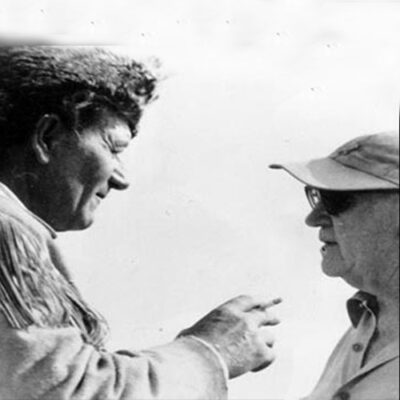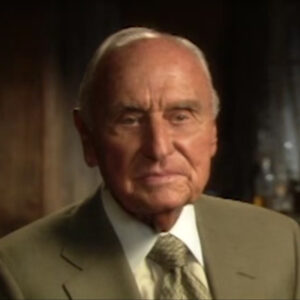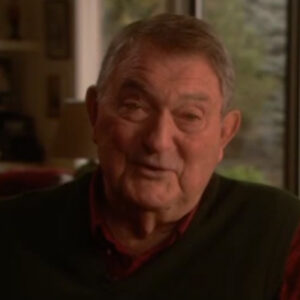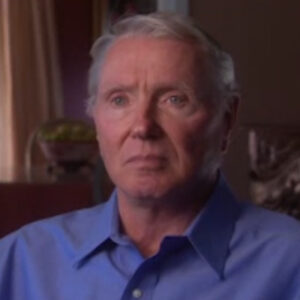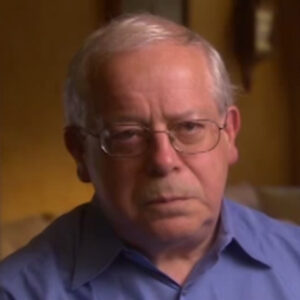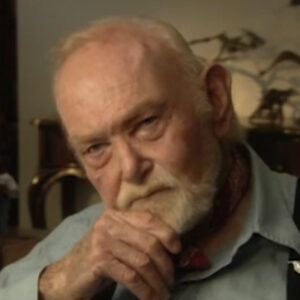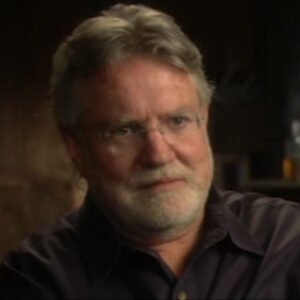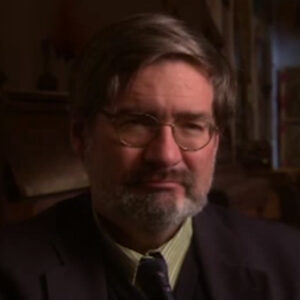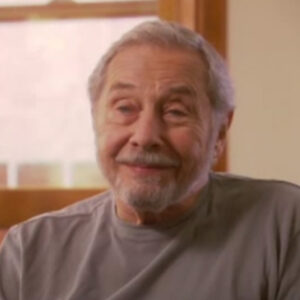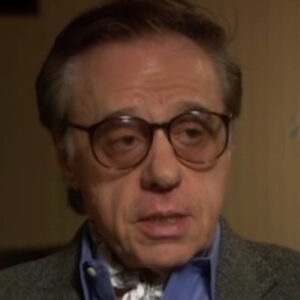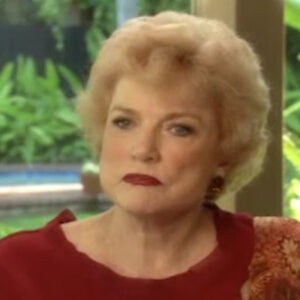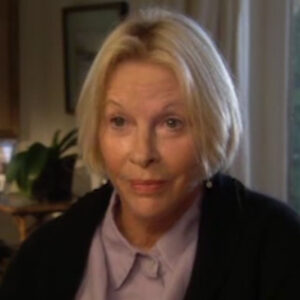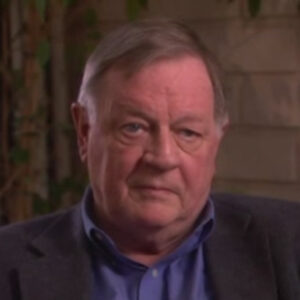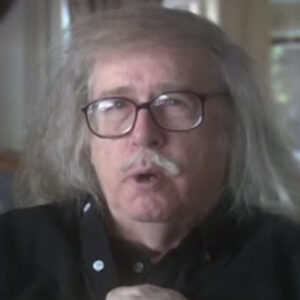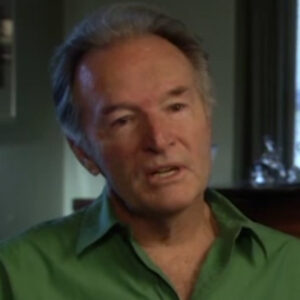Speaker About your first full experience. It was way too personal.
Speaker Well, it was really when I was born in 42, so the mid 40s, late 40s, I became I became aware John Wayne as an actor and I give key films, really Wake Up The Red Witch, which is a remarkable movie with a wonderful flashback structure. Right. And but that was really John Wayne, the movie star. We were kids. We didn’t know. We just thought actors were up there and the people were up there on the screen. We don’t want another we’re actors. We don’t know anybody had anything to do with what they call behind the screen. So if you had imagined or you’re playing with your friends that you were that you were doing a movie, you thought the person in front of the lens did everything. So there was that.
Speaker But there was another very, very important one of Wayne before I was aware of John Ford, and that is the Red River I saw at the age of six years old.
Speaker And I immediately I immediately zero zeroed in on Wayne as a serious actor because he convinced me in that film it was godfather of the Old Testament and and his tribulations and trials with his son, like Montgomery Clift.
Speaker And he he turns in that film, he turns and I believe that’s also the film that from the John McBride book pointing out that John Wayne said, I don’t know the act. So he put it he pushed him into another level, which was the searchers, you know, but the that’s a quote from the book, by the way. I am I didn’t understand that.
Speaker But the thing about it was that I had no problem, in a sense, as even a young film enthusiast or lover or or I can put it up, a kid who who, you know, was sick all the time with asthma and all that sort of thing that took place, I could go to a movie theater in the church.
Speaker And so Wayne to me was a serious screen presence and was not something light. So because of Red River, I took him as a straight, very strong actor, the first John Ford Wayne film that I can remember seeing on a big screen.
Speaker And this was after seeing maybe a few of the few bits and pieces on television, maybe for Patsy, a little bit of the stagecoach maybe. I remember dying to see Stagecoach. I was I was five years old and was on a rerelease and I only saw the trailer, but my parents wouldn’t take me. There was there was one of those things. And to this day, my mind had never really seen the film, you know, because I had seen it then it would have been something.
Speaker And just in bed in my in my brains in a way. But but the very first one that I saw was was the quiet man.
Speaker And I was 1952. I was 10 years old. I was on a Saturday afternoon, Loews Theater, six feet Second Avenue and place was in an uproar, a warm, wild film.
Speaker Very funny. And I must say visually, one of the most beautiful things ever put on film.
Speaker I mean, along with that and the red shoes in the river, there was the river. It’s an extraordinary, extraordinarily beautifully made, beautifully shot film. I understand it was misty and rainy all the time, but, boy, did that help that Technicolor and a sense of authenticity of the people of the place. And and also a film that’s in very, very strong need, a restoration right now. Hopefully we can pull that off one of these days. But in any event, it was a very moving experience. But it was a wonderful experience for young people, too.
Speaker It was a it was full of life and a great deal of humor and characters that even though we came from an Italian American background, we’re beginning to feel an affinity with the nature of the Irish and the Irish American and the films, the way John Ford portrayed them.
Speaker And I mean, that’s also my my parents watching Ford films on TV, watching how big was my valet, for example, was something that was universal in terms of our families, working class families. And this is something that that sustained Ford all the way through for me and was a major influence on me because of that. But the quiet man is just decidedly Irish, there’s no doubt about that.
Speaker And but, you know, the quiet man is a picture that that there are issues with. And you need a whole other show just on that one film.
Speaker This is the way that people behave in the nature of the taking of the wife, the the nature of the battling, the physical, the physical conflict between the weight and power, you know, but it’s all seems to me, you know, which is certainly politically politically incorrect today.
Speaker But it all seems to me dealing with Becta, McGlocklin, the brother, the sense of honor, a sense of dignity, a sense of ritual, a sense of ritual from a time and a place that ultimately she takes that back shillelagh, whatever it is that an old woman gives Wayne to beat her up with the wife, you know, and at the end she takes it after they after all, after all the battling is over, he takes it and throws it away.
Speaker He’s not going to.
Speaker If she wins, you know this as a community, how important is a all different levels?
Speaker Yeah, exactly, exactly. And what the thing about it is, the beauty about Ford is the dignity of pride, but also also the the downfall of pride. And you see this the downfall, the dignity, the good and the bad side of being proud.
Speaker And you see this beautifully in the quiet man you see on every character, particularly Viktor McGlocklin, this whole business of the dowry, this whole business of the donnybrook, that they start and people come watch some sort of ancient ritual in a way that is smashes right up against today’s concept, especially in America, of how people should behave, and rightly so. Rightly so. We are coming from and I don’t know how much of that is to be taken seriously in that film. The film is a comedy. Even back then, the film was a comedy. I know you should get a clip for your film there.
Speaker As I saw it in Rome, we’re doing Gangs New York. There was a black and white, I think, documentary done in France on Ford, and he’s sitting there as late 60s. And to the French reporters ask him, what about all the beating up of the women, the wife in beating up a women in your films and the white man, for example, when he says, I got it from the French, what do you mean? So that dancing passionate. Said, what do you mean? You know, you know what I’m talking about, the man throws a woman around the room.
Speaker I don’t I, I this is this is his attitude.
Speaker And he comes from a certain time, a place, you know, and he also comes from what’s great about it is it is half in the 19th century and half and the twentieth, the first half of the 20th century tries to make a change in the last half of the 20th century. It’s interesting and his work, but also coming from a background, we took it as comedy. We took it as a kind of broad comedy, even at that age, because it came from I came from a world where the.
Speaker It’s again, as I say, you could do a whole film on The Quiet Man alone because of this, this this these issues in the picture.
Speaker I can’t remember where it was, where I was told by my father. The the issue of raising a hand to a woman was anathema.
Speaker Anathema, not that didn’t happen, and this is obviously not look at my movies, you know, it happens to certain people sort of relationships, whatever, but this was something that was almost looked upon as barbaric, you know, and I’m talking about.
Speaker You know, the working class, lower working class people, I mean, these are these are like any of the top people I was living with. So it was a very interesting thing. So that in a funny way, the picture was more of a ritual, has more to do with pride, has more to do with.
Speaker Establishing who they are, Wayne and O’Hara, as cars, as people in that marriage and that relationship, of course, is much more to what he comes to. He comes to Ireland, back to the homeland after the tragedy and the rain, which was a key one of the key reasons why I shot that reginal in black and white because of that wonderful flashback in color and his strong emerald green.
Speaker You know, I can’t I can’t shoot this thing in color.
Speaker You know, I just keep thinking before I’d seen. But that’s that’s the first one. And in a funny way, I see when I think of when I think more, of course, of as I say, the searchers and Red River, but really the modern when I think of with that cap and that wonderful tie and the tweeds and the beautiful scene where he pulls she she pulls him, he pulls her back, somehow there’s that wonderful kiss, you know, the wonderful kiss in the wind. Yeah. And and, you know, there’s something very remarkable about it. I mean, you know, there is there are issues, other issues, too, of course, of the caricatures of the the Irish and that sort of thing. That that is I’m not qualified to speak about it. I’m thinking about this.
Speaker And also to you insist on it, was that, you know, for the sense of the immigrant experience to be the first generation Irish. Yeah.
Speaker Now, imagine Italian, a Sicilian going back to a small Sicilian village, a Sicilian American. I’ve done it. I lasted two days.
Speaker Granted, it was a different time in 1991, there were a couple of there was some wonderful family members still live there. My parents were with me. My parents stayed six weeks. I stayed two days.
Speaker I mean, I felt I belonged, but I really feel sorry all around the issue now. But I really felt that that I. I was the outsider, but the roots were there, there’s no doubt about it, the roots were there, the paranoia, the the the extraordinary. The paranoia going along, I was mentioning the negative person, I mean, I don’t mean that in a bad I mean that I should say the positive thing was the family, the family, the sense of the connection with the earth and that life revolved around you.
Speaker No one thinks, you know, idyllic of of Arcadia in a way. OK, you know, the land, you know, land giving back life. I saw it there. I saw it there. But I also saw the nature of a small town in Sicily and the dangerous elements that go along with that to the paranoia of saying that sort of thing. But I felt that. I felt that with the men in the coffee shop outside the coffee shop my Sunday morning, all dressed in black drinking coffee, no women there.
Speaker The women would be women were in a different part of the town. At that point. I watched my father walk up to three or four older men in their 60s to ask them in Sicilian, the Sicilian of 19 1910, because that’s where it stopped in New York to follow its advance since then in Sicily.
Speaker But but he went up to them and asked them if they knew that they knew the the house his mother was born in, etc. He gave a name and he looked like he belonged with them. But nothing had ever changed. Nothing changed. I was different. I was the outsider. But I felt the roots there. And I think to a certain extent you feel that way. And he’s looking for that important quiet man in his arms. But he’s got to be he’s got to prove him. He’s got to prove himself. There has been one of them. I can’t. Constructor, deconstructive, what’s that they used today, deconstruction.
Speaker I can’t analyze what it really means in terms of language, culture and what Victor McLachlan’s character means.
Speaker I just know that the sense of pride is something that is deflated in the picture and ultimately to become the way they retain their dignity. Ohara, particularly with Wayne and I felt very good about the picture.
Speaker As I say, it’s in need of restoration.
Speaker We’ve got to get the studio to do what we also have one of the four things that you would buy a lot as a surgeon.
Speaker Yeah, yeah. What is it about the surgeons it has always had to talk about?
Speaker Well, I hope I can talk about it eloquently, eloquently. I mean, what happened was that it was three years later we had been graduated from and the day we graduated from St Patrick’s Elementary School, myself and two friends of mine went out in the street and we were allowed to go out that night alone uptown to movie theatre and see a movie.
Speaker And we went out with a little dinner in a restaurant, famous restaurant at the time.
Speaker And so we walked in. And normally, I think, you know, in those days we just walked in the middle of films like A Walk in the Middle of Vertigo.
Speaker You know, you just walk in the middle and then you stay again if you want to see the whole thing. And so there it is, the Criterion Theatre. And there’s a circus and it’s a John Wayne Western.
Speaker And we heard that it’s pretty, pretty good. And if we read reviews at the time, but it was the latest on the papers that it had there and it had a sense of feeling of of the vastness to it. We felt from the edge, you know, sense of something special. And so we walked in and there it was. I believe it was only projected in this division in two theaters in America. And this was one of them. And I’ve got to tell you, you never see anything quite like it.
Speaker The best division image on this picture, particularly the wide shots of Monument Valley, and particularly when he shoots the wide shots and writers or writers and to frame either write slightly below the camera, low angle on the bottom right or the bottom left is phenomenal.
Speaker It’s just phenomenal. You felt you were there.
Speaker But Monument Valley itself is fascinating because somehow the landscape is like the crooks and the crooks and the kind of like the jagged edges of the psyche.
Speaker In a way, your brain, it just it just it lays out like it’s like the film ultimately became like this wild. Their psychological epic that the landscape really reflected, and I don’t you know, I we didn’t think of that at the time, we just felt it, particularly if you saw in this division, because you were placed within those tiny figures in Monument Valley, weren’t that tiny in this division.
Speaker But the the rocks, the rock formations were big.
Speaker And but there was a sense of space and the sense of the universality of it, a kind of a kind of a landscape where ultimately Chuck Jones would do the roadrunner. Any place to do it, you know, just goes on and on life. Life goes on. The road keeps going. I mean, the coyote keeps trying. He keeps trying. The interesting thing about the searchers is that when we saw Wayne’s character in The Searchers for us in 1956 coming out of the Cold War, that was still in the Cold War, coming from a fairly conservative working class family, that my father had been a Democrat and, you know, Al Smith and Adlai Stevenson, but then in 56, voted for Eisenhower.
Speaker So things have changed and.
Speaker We will also becoming aware of a change in freedom of speech in America and cinema out of Preminger, particularly now with the golden arm, you had so many pictures coming to us, pictures, each of differing differing quality, you know, but themes and ideas were being put up on the screen that weren’t talked about, you know, and you had this whole weird thing, of course, that we look at now where now, of course, because post war, the what we call these darker movies, these gangster pictures, everything in gangster films that win wars. And everybody was totally fatalistic in those films, of course, out of the past. And I saw that when I was about four, you know, just playing in the local theater. My aunt took me to see it.
Speaker There were all these, all these and the big heat, Fritz Lang and so many films building up to kiss me deadly. So that in a way.
Speaker And particularly, I’m sorry if I’m going about, in a roundabout way, talking about it in a way in the world I lived in, that’s the world I knew. I loved Westerns because, you know, I live in the city tenements and, you know, I go to the theater and I see this big screen and color, even black and white was fine.
Speaker You see those horses running. All those horses were wonderful, you know, and the characters, the cowboys.
Speaker And I should say to the characters in the films, were they always cowboys? But they were particularly insane, which one of my favorites is is a good man, but is a gunfighters of a romantic character.
Speaker The father, played by Van Heflin, is just a strong man. The boy learns ultimately, you know, and it’s a beautiful film.
Speaker But that was the exception. And I mean, I was I was used to seeing Westerns where the good guys and bad guy, you know, and I kind of like that. Which one even that you can see here was the difference. So what the things I just saw, the good the bad guy and that sort of thing, I was used to that. The show down the street, the the the the shootout. And in a way, I liked it.
Speaker Where I came from, I tell you, you know, the morality was such that when morality came to use the word morality, it was a certain world where, you know, it was almost feudal in a way, and you had to be very careful and be very careful who you respect was important.
Speaker I saw people get hurt. I saw people disappear. I don’t know. I just I just know that that ultimately up on the screen, it was simpler. The landscape was best when people weren’t on top of each other.
Speaker There was still a chance of creating something new, that in the process of creating a country in a way, a whole new society. And we saw Ethan Edwards. I felt totally at home with him.
Speaker This is the guy this is the guy we know.
Speaker We know this man, and besides which, I know him from Red River, you know, I hate to say this like, you know, my father and I got along very well over the years and, you know, I was you know, we got to enjoy a lot of my work. He was acting in my movies and stuff towards the end.
Speaker You know, as a kid, you for your father, we wanted Shane. But in a way, in my mind and the worst parts of my mind, I sort of got like Ethan.
Speaker I mean, he would be he’d be mortified. I’ve ever heard that now, but I don’t mean that.
Speaker I mean, in the darkest part of mine, when things were really difficult growing up in the struggle between fathers and sons, I saw, you know, my father and seven brothers were racist. And the terms of reference is racist. But he is definitely, you know, you know, telling me about a convention where nobody can sleep mean he can you ride a horse and ride a horse.
Speaker You ride a horse horse. You don’t get sick or die whatever commensal come along, pick up the horse riding another 100 miles, then kill him, then eat him.
Speaker And that’s just and kept saying, yeah, but don’t even say that his attitude towards Martin Pawley, the whole father son relationship, was something that was very powerful for us when we saw it.
Speaker But we had we felt totally comfortable with him because that was America matter the time. That was America. I mean, you’re dealing in some very tough movie. He you know, I screened it here two weeks ago again.
Speaker And to see it again on the big screen was remarkable because it’s like one of those films.
Speaker It’s so pivotal in my life, you know, Citizen Kane, that On the Waterfront faces I mean, shadows and a number of the Red Shoes is I don’t want to see it again. I’ve seen it. I’ve seen it so many times. You can’t count how many times you’ve seen. It’s like listening to music, you know, so. I didn’t really want to see it. I wanted to to refresh my memory on certain things, certain lines of dialogue or whatever, and we’re sitting here and by the opening frame, I was hooked again and I was moved again by it, the camera going through the door. I was also moved by his loneliness, the outsider. I love that idea that even when he came in, he was an outsider at the beginning of the picture. He can’t stay with them. He’s what he’s done in the war, what he’s seen in the war. He gave his oath to the Confederacy all but that means as an implication, there’s a there’s a lot behind that, too. And ultimately, that builds to the issue of of how he changes his mind on that five or six year track, whatever it is, to find Debbie the captive.
Speaker The point of the whole turning point being when he finds these white girls that were with the Indians and and they have met the fort and they’re out of their minds, met a number of senior 13 year olds, absolutely frightening.
Speaker It was almost.
Speaker But it really captured to the kind of Cold War paranoia of invasion of the Body Snatchers of all these films are being made at the time, invaders from Mars, William Cameron Menges, where your soul would be taken away from you if you were a communist or anything. But here went further here.
Speaker It dealt with the very issue, the very issue of the crux of what.
Speaker The nation is supposed to be really a nation of freedom for all. And here you have a guy saying, you know, hard to believe that white collar.
Speaker And it turns, it turns and there’s a quick tracking shot in Wayne’s face, which I’ve got to tell you again, if you saw in this division. Said everything was remarkable, you know, this extraordinary hatred. Extraordinary.
Speaker And also also this issue of vengeance, vengeance until vengeance becomes for whites. What is what is it what is he going to do with this young woman when he finds her? Really?
Speaker First of all, he doesn’t even find her. The warden mows the old crazy, the old fool. He helps out more than the other guys, you know. And he’s got some wonderful lines of dialogue, too. Very biblical says he says the rocking chair. Rocking chair. Yeah. And also when he’s in the rock and composing and he says he was captured by scar and all that noise is sitting there and he’s rock. And I said out of was crazy.
Speaker Ethan, he said, ate dirt, chewed grass. And that comes from never Canessa and Babylon, the Old Testament, before God destroyed him. I mean, what’s interesting about the language in the film is that it’s based on the puritanical, puritanical tradition where you have the double edged sword, you have the reverend and the Warrior Borbon.
Speaker You know, he says, have you been to the river? You know, I’ve been to the river. Moses Moses. I’ve been baptized. I’ve been baptized ravenously will get right. I’m going to do it again.
Speaker But every reference, every reference in the film has to do with the soul, has to do with has to do somehow with also that force that was creating American society, which was based on Puritan Puritan religion.
Speaker And I think some of the language of the film, Frank Nogent, use that use that in a way makes it very poetic, like the Old Testament.
Speaker But it’s there’s so much more, I think, with what happened, I guess what Ford was reading a little more about it.
Speaker And as I say, I’m not a scholar on this sort of thing. I’m telling you what I saw from the screen. But after seeing Mr. Roberts and a few other films, the early 50s, what Price, Glory and a few other films that he made, maybe they weren’t up to his earlier films for it.
Speaker And I think I know reading now that, Mr. Roberts, that there was a big problem, what with the production and his take on the picture and his own personal life, whatever.
Speaker I reached the age of fifty seven. Fifty eight years old, you know, does he have more to give? Can he pull? He’s also gone from World War Two. He was actually there on the battlefields.
Speaker Now, you know, apparently it didn’t end well that another director came in. American, the Roy and Joshua Lowenstein also shot some scenes, some enjoyable film. You know, actors are wonderful. And so maybe. Where some people would just go home and, you know, yeah, I mean, say, OK, well, the stagecoach I did, the fugitive I did, which has got problems, I think.
Speaker But apparently he like the fugitive a lot. Yeah, he really did scream.
Speaker I recently took the wait shot is amazing, you know. But what I’m saying is that I think maybe he took the searchers as a way of pushing forward, pushing himself forward and as a comeback in a way, too, but also to explore new territory. And who does he he’s got his mandate. He’s got when we started with a stagecoach that he worked on, 14, 15.
Speaker So it was about that collaboration.
Speaker So I. You know, it’s a blessing, really is, I got to say, because in the case of bother me.
Speaker We’re the same age.
Speaker We he was not a movie star, was not a director of note at the time, which we worked first, worked together, and so we made the movie together with Harvey Keitel and everybody else.
Speaker But we made a movie together based on my life from Laurie side, my friends, by the way, one or two of which had come to see the searchers with me that night when we were 13 years old and.
Speaker We didn’t have any group, we were working, it wasn’t making a movie with a movie star. And so when we came together on Taxi Driver to Paul Schrader and. Trying to put us together, really. We also felt that something happened in that picture.
Speaker Going back into Main Street, Dinero had been.
Speaker In the same area where I grew up and at the age of 15 or 16, he was sort of hanging out, quote unquote, with the different group guys up by Hester Street or Grand Street. And we were on Elizabeth and Prince and that sort of thing. The groups didn’t mesh that well, but we would see each other. And after our clubs and places like that, he was always very sweet guy from what I what I remember. And I just thought he was another neighborhood guy from further south street.
Speaker And so he knew the people or aspects thereof when I was doing the mean streets. So it was like I was just suddenly there was something that we both were formative in a funny way. We had we had experienced a formative experience time together, really. Our characters were formed right around that time, the better for worse. And so we could always draw back and we knew a gesture like that wouldn’t be right. You know, that knock on the door a certain way isn’t right and a certain word isn’t right. And also certain feelings couldn’t be discussed and felt they were understood. If they were understood between the two people, no amount of talking is going to make it work.
Speaker And that’s what we discovered on Taxi Driver, too, although they had nothing to do with the old Italian American neighborhood downtown. It had to do with something deeper and and.
Speaker The outsiders, we’re outsiders, we’ve never seen anywhere. I don’t think he did. I only found that out later. I thought it was fine. I don’t know. I have this outsider’s asthmatic kid who was always like to survive in the street, had to sort of be comic relief for these tougher guys.
Speaker So, you know, and he had to be careful was a very rough kind of thing for me.
Speaker And as I say, it’s a funny thing to talk about it that way. But because a lot of the young men who came out of that world and women are lawyers and bank presidents and but there are others that weren’t I’m sorry. They just just weren’t.
Speaker And some are gone. And, you know, we we were we were the outsiders. I think that’s where suddenly all that. Emotion that Fred had put into that script of Taxi Driver came together in the Travis Bickle character and all the negative, all the negativity of the fantasy and then crossing the line from fantasy into acting out the fantasy, the disaster, the catastrophe.
Speaker You know, the apocalypse. The apocalypse of being a loner. Now we’re going to get you now. We’re going to take it out of you. I’m going to get.
Speaker I think that as young men, boys, maybe we start when this is all churning inside of us and we never spoke that way about, by the way. I never saw anything. I understood the loneliness, understood the rejection. And the feelings of frustration and infinite frustration about the unspoken, the unspoken, I think this is extraordinary, but this is what happened then over the years we started working on prices and then he put me on Raging Bull into a comedy. I pulled him into New York, New York, and then later on Goodfellas.
Speaker And so, you know, I think after Goodfellas to Cape Fear, that was that was sort of a thing for really trying to do, like a movie movie in a way we’re trying to.
Speaker But I think with Ford and Wayne, you know, it’s it’s slightly different, I think, because it was more a father son. I would think looking back as different generation, Ralf’s discovered Wayne and he put them in the betrayal as Marion Morrison, I think. And, you know, I think I don’t know the story of how he finally got to Stagecoach, but I know he was doing all those be Westerns during the 30s.
Speaker And as Johnny Ringo, he goes from Johnny Ringo to Ethan Edwards to Frank Weed, you know, to I forget the name of the character, but in Tandia and Malleefowl, Liberty Valance, now you have a progression. Not only do you have father and son, but you also begin, I think, to see a relationship of these two men in which ultimately somewhere in the middle and I think it’s around the 50s. After Fort Apache, right around Lincoln, searchers where they were, they kind of blend together, they become the same person.
Speaker And I think the beauty of this whole thing with these two guys is that you have, you know, from the old from the older way of looking back, that you start a young man full of optimism and, you know, the creation of a world, the first half of the century, the fighting World War Two, all that sort of thing. And then you see them develop and grow into older men.
Speaker Reflective and melancholy, not the melancholy is a good thing. It’s just that it’s it’s real and it’s as you get older.
Speaker It happens and you see this come to total, it’s amazing to have made this and made this journey within the American studio system.
Speaker No, no, no.
Speaker These personal films, you know, I was watching the world I looked at the other day. That’s exactly what I was feeling to watch John Wayne from Ringo. Oh, see.
Speaker Yeah. Yeah.
Speaker And I think I think there’s no doubt in according to McBryde book, which I like the book a lot, you know, apparently four did say after seeing Red River, I can act. I want to put them in the searches.
Speaker And, you know, because I mean, let’s face it, in Fort Apache, Fort Apache, as kids, we’re looking at these Westerns and we see the cavalry westerns for me were more more important. And it took me years to discover my Darling Clementine, which for me is my favorite along with the searchers.
Speaker But but in any event, because I see so a lot of these on TV and sort of patches on television for a while.
Speaker And what’s interesting for Apache, you know, we have everything that as younger people, we were young boys to be attracted to, which was the sense of duty, obligation, the creation of something new, a new society balanced also by the women, but not necessarily by the men, had our characters and things like that. But people like finally. She is the key, so, you know, but ultimately, the more the more that, the more that they create this nation, quote unquote. Leaving aside, of course, the genocide involved, which is. The elephant in the room, you know, that’s their moment when you look at these damn pictures, but what happens is that you have you have the creation, the settling of that area, the army, the loners.
Speaker Ultimately, he becomes more about the army than loners. But the loner is the army and all of them the civilizations.
Speaker The old story become civilized. They all go, they’ve got to leave. There’s no room for them. There you have Tom Donovan in The Man Who Shot Liberty Valance, but also begins in the searches and begins the search. As this man is like a rabid animal by the middle of the film, he can’t be trusted on anything. And, you know, it’s an extraordinary moment at the end when he finally says, let’s go home, daddy, because you’re pretty sure he’s going to try to kill her. You know, really? Absolutely. It’s significant that it was not in the script when I read Anne Frank script that you don’t get the the shot of Wayne walking away at the end in the script.
Speaker It gives the impression that the world going home, he has her on his lap and also. In the, um, I got off of me, I was talking about Fort Apache.
Speaker In Fort Apache, we have the beginnings of the end in a way, in a way, because we have when portraying a young man who’s fulfilling his obligation, his duty is a good guy. In fact, a little bland when I say being so good in the film. But you have Henry Fonda’s character and then Father’s character is filled with your pride. And it’s just the beginning of the downfall. You know, you just begin to see. So in a sense, looking at the earlier films before you begin, you see the creation of the society and the civilization, but important fort. You begin to see the crack in the armor, you begin to see it. And it has to do with individual behavior and a sense of pride at the end at the end of the film. I have a bit of a problem with the reprise of the super positions of the soldiers. And I also have a bit of a bit of a problem with print the legend, the kind of movies I make, you know, when we know it was corny to me, you know, maybe when I was. I guess when I was about 12 or 13, I didn’t mind when I saw it, when I was 20 at the New York theater on a big screen, I felt the ending was was a bit overdone in terms of style. And I understood what he meant. Print the legend because it’s still creating a society. You’re still there, something you need that you need that legend to to give people inspiration, to move to for the poor people to to act rather than the and, you know, rather than become apathetic. And so you need role models, you know, and would have been devastating for the man at that time to have that captain. Thursday, I believe his name is be shown for what he is, which which is really which is really what it’s about. Custer. General Custer. Yeah. A Little Bighorn.
Speaker But it’s remarkable the sequence where when I went to Promontories and Henry Fonda and the men playing Geronimo and the translations, the intercutting, that extraordinary intercutting and Pedro Mendez’s great performance as I was moving back and forth doesn’t want to translate what what what Henry Fonda just told them. You know, can anybody understand what I want? Yeah, yeah, yeah. And you look at the wonderful actor playing Geronimo and he stands up a mortal. It’s just, you know, but but that was the beginning of the end. That’s where that’s where it got interesting to me.
Speaker Now, having not seen these films in autumn, mind you, I’m also not a big screen at first I not see my Darling Clementine, you know, and so the cavalry trilogy was the well, that was the best for me of the three Rio Grande.
Speaker I have to keep revisiting. I have to keep looking at again. I don’t quite get it. I don’t quite get it.
Speaker Suriel, Oregon, What I love about where we’re Yellow Ribbon is Nathan Gretel’s is the Wayne playing the older the older soldier.
Speaker And here again he takes it begins to make that he begins to make that that that shift in a way, a sense of melancholy, talking about the old soldiers, the two scenes, the wonderful scene where he goes to speak to the had the Nathan I am the chief is Nathan. I’m a Christian.
Speaker I talk about let us sit and and talk and let the young ones go and fight is oh, what a world this is. You know, we begin to realize, no, no, I’m too old for it. We have to try to stop this and that.
Speaker But the beauty of the film is really, I think in Wayne’s performance as the older brittleness and particularly the scenes where he talks to his wife at the grave, you begin to see the transition from Stagecoach to, um, from Stagecoach and Johnny Ringo to bridles to Ethan Edwards. You see also the you see the progression of the country in a way, the brighter to the darker, you know, or more realistic.
Speaker Let’s say I get to live by Liberty Valance. It’s black and white.
Speaker And it’s also for me is also like production. And the production element is very, very spare. It’s very.
Speaker But not for me. The spareness and the precision of Syco, for example, really makes it work for me, which he did with the television crew. Hitchcock whereas this one I went to see at the Capitol Theater in the first two days of playing, I quite honestly was disappointed because one thing I expected from Ford at the time was a sense of authenticity, a texture character in the wood, in the wood, in the lapel.
Speaker I just felt that. And of course, you know.
Speaker It’s probably blasphemy, but I was very upset by the picture when I first saw it because of that, you know, I mean, you look at the searchers and you see even the the iconic scenes, quote unquote, comics, King Curtis and Jeffrey Hunter, you have to understand who they’re playing younger boys and they really are.
Speaker They’re old men playing younger boys, and they have to fight it out at the wedding. But even there, they’re trying to be civilized and they have a spit of that firewood and that sort of thing. It’s kind of cute in a way.
Speaker It’s a little much.
Speaker But what makes it is the the flurry of the bodies, the dust, the red dust and the authenticity, the feeling that the texture of it. I had a problem with the whip so I couldn’t see beyond it. And also the schematic and the schematics of the story that Bogdanovich was right about, Andrew CyrusOne, all of them write about it is, you know, a masterpiece in that way, I must say. But because it goes with these themes, it deals with the themes. And it’s it’s finally he lived long enough to finalise them to give you a last the last the final word on the themes and to see Donovan leave, you know, that that he cannot live out there anymore, but in a more benign way than Ethan Edwards.
Speaker So it was sweeter in a way, it was more melancholy, melancholy. What’s interesting to me about.
Speaker Madison, Liberty Valance. Is ultimately good for deals with there is in the scene. With the stake. The state lands on the floor.
Speaker Lee Marvin is all over the place, he is overacting. I love Lee Marvin, but it’s so funny what he’s doing and he’s having a ball. You know, he’s at that black leather. He’s got to thank God. And John Wayne, I’m not picking up the steak. You pick up the second Jimmy Stewart comes and says, I’ll pick up the steak. This is ridiculous. It’s one of the great scenes of movies and American movies that you can’t because ultimately it’s what are we fighting about?
Speaker What is this? And then ultimately, what’s great about the picture is the sense of what you know for me. And it’s a thing that hits me in my my world. What is what defines a man?
Speaker It’s Stuart Stuart or is it is it Wayne, and it’s both in a way, but, you know, but it’s so wonderful to see Stuart’s performance again, playing younger than they should be. But but seeing him confront these two guys, one matter than the other, dealing with pride, again, dealing with brute force.
Speaker And a time in the world where we are now again, but it always makes me think of that, is that really meant I was not the Jimmy Stewart character because he’s bringing law to the to the West in the civilizing of it. And the poetry of the cactus flower imagery is extraordinary. But I guess I’m a blessing God, because I it’s one of the films that I can’t I’m not.
Speaker So in terms of Man Who Shot Liberty Valance, yes, I admire the picture in my but I was taken I was taken aback by that.
Speaker By the what?
Speaker In a way, now it can be seen as a virtue to which is the stripping down of all the externals and when getting right to the heart of the themes. And that also means in the nature of the warden, the nature of the lapel that I was complaining about. You know, the studio setting for the night scene with the stagecoach is right in the beginning. It’s it’s it’s it was distracting me. But it’s the schematic of it is like the later films of Fritz Lang or, you know, others will became simpler in a way.
Speaker But because of by that time I had discovered my darling Clementine. Still, because of pictures like that, I had expected something else. But in any event, I felt the same way, I guess, as a sort of blessed blasphemy in a way. But the genre my films was one of my favorite directors. I discovered when I was eight or nine or 10 years old, watching television, his American films, The Southern Ah Diary of a Chambermaid. And then my father took me to see The River, which is one of my favorite films. I was 10 years old.
Speaker And then, you know, 1958, they rereleased Grand Illusion and I fell in love with that film. I kept watching and going from theater to theater. And then in the when I was in, I think it was late 60s rules of the game, the liturgy was shown and I said, if this is the greatest, the main, I went to see it. I don’t get it.
Speaker I didn’t get it. And I liked it. I liked it.
Speaker But I wonder over the years, OK, so I’m not sophisticated. I like, you know, and I look at it and I say, wait about a years later. And I realize, of course, between the wars and I get a little more history and began to realize what it was doing about French society and the bourgeois. And I think but still, my my immediate reaction to the first time was one that was slightly disappointed or just enjoying the film. I didn’t quite get it all and it wasn’t moving to me in the way his other films were to me. And and that had many I was joking about it recently and I said, you know, I just never I was never around chateaus and having, you know, relationships with the countess.
Speaker And, you know, it’s out of my league, guys. I mean, I’m sorry. I’m just that’s that’s if I could admire it. I don’t know if it’s the greatest film ever made.
Speaker I think because of the film Modise, what happened to it at the time? Maybe one overcompensates. But but Ramla, for me, you know, the river probably is the one that that is that is the one that’s plus CNN, Tony, and some of the others that he did. But in any event, I had a similar reaction to Liberty Valance. I guess I you know, I must confess it here that but I still have a bit of a problem that way. It’s good to look at now those those externals that I was concerned about at the time don’t bother me anymore. When I see it begin to see, I look at the people the best the best thing about his pictures, the way he deals with people.
Speaker You see Ford also, this was a Ford, basically a Hollywood director. It was a bit autobiographical.
Speaker That’s what that’s what’s so fascinating about that.
Speaker When you look back and you see these these films, I only trace the history of America. But they go they chart the progress, the the positive things or negative things. This means the travel of the soul, so to speak. His life. You know, you really do believe that. You know, I really do believe that.
Speaker And there’s something about Ford, though, that was that nobody else has.
Speaker He would change the tone of his film. He put comedy and where where you wouldn’t expect it. And I don’t mean just the the alcohol comedy, the kind of ways to be too broad. Now, it’s kind of excessive and other things.
Speaker But but there was the relationship of the two or three minor characters in the background. They had a whole thing going. You know, I have a whole thing going in, a wide shot, you can’t pass by the one Galson one line and one would send a line and they’ll be it’s just extraordinary relationship.
Speaker So it’s like it’s the way it’s the way all of Carrie tells Ken Curtis. You know, when he says she wants to stay for supper, I won’t take no for an answer in the searches.
Speaker As she moves out of frame, she goes from left, which is moving. So I know the thought of no one ever entered my mind. He says I in all of that, all of that playing on that John Collins, the letter. The letter, which is so extraordinary, the letter, because, again, one also gets a sense of what the world was like at that time. He says, by golly, two letters in one year. This is amazing. And there was no there was no communication.
Speaker People were living out there alone, you know, Kwanzaa, the humor, the humor of of and when she when when Miles reads the letter and talks about the quotes, Martin saying the late Mr. Futterman gave us this advice and she was like, he must have died.
Speaker And Carrie says, Oh, poor man is stupid. And of course, I’m going to just kill them. He was trying to ambush Wainer, all of them. But it’s the humor of all the way. Oliver Harris is a poor man and they move on also the way the letter is read and the intercutting of.
Speaker The flashbacks in the letter and the change of narrators, she narrates very miles and Jeffrey Hunter narrates. And also, if you notice that there’s no dissolves, it’s all straight cuts the way Alan Rainey would use later five or six years later.
Speaker And I was saying recently, an interview about I’ve just seen these films by Mikio Naruse, a Japanese director, and I saw one from called Floating Clouds in which he uses these masters.
Speaker These old masters just didn’t care about that sort of thing. They just said, listen, it’s a flashback.
Speaker We’re going to cut straight to it and did the same thing. And then obviously films. And I found it so refreshing in a way. And I mean, it’s a matter of style, but because, as I say, there’s flashbacks within flashbacks and other films that work beautifully. But the way forward had no time for it. He just had such command of the story that he was just able to make a cut and move along.
Speaker And you understood it, how it influences his visual style.
Speaker It influenced me in that I can never get what he gets.
Speaker I’ve always tried and then I say, why am I crying, I’m shooting down an alley. I said, Well, if you shot down an alley, the street will be wet and you’d have a big arc lamp and the beautiful beam of light and everybody be silhouette against that light.
Speaker You know, the mist will be coming up. And where I came from, there weren’t big arc lights in the alley. It was very dark.
Speaker And so I sort of went that way. I’m a more, you know, what I saw growing up.
Speaker And if so much, I saw buildings. I saw, I saw, I saw. I like it. I like what I saw. I still do. I don’t want to necessarily live in it, but I like it at the alleys. I didn’t see any light much. We didn’t see much light. I was telling jokes about not really knowing where the sun is, and I should now have a real problem about shooting a certain place at a certain time of day.
Speaker And then the cameraman would get that same. The sun’s not going to be there tomorrow. Of course not. I didn’t know because to me, you know, looking at the third floor window in the front and the sun was either there was raining, it was dark, you know.
Speaker And so for as much as I want to be able to have the extraordinary, it seem effortless ability with himself and his remarkable cameraman to get those images from the 1920s on, even in these minor films we made in the late 20s and early 30s or even, you know, interesting ones like prisoner of Shark Island, I almost unable, unable to, to and unable to do it. I unable able to visualize it. One of the important beautiful shot, beautifully shot. But I think what ultimately translated for me from Ford was we’re talking about the humor, but it has also to do with family. It has to do with relationships of people, of warmth between the people. And one of the key scenes is, for example, in The Searchers, where what Bonds company arrives at the farmhouse and has a wide shot there at the table.
Speaker He comes in, grab some of that coffee, sister, you know, that sort of thing. And he’s standing there and he sits down at the head of the table and said, Debbie, you’ve been baptized.
Speaker People are running around the frame. It’s all one take. And if you listen to the overlapping dialogue and if you’ve seen investor vision in widescreen or just seen on a big screen, you could really feel community, family and a warmth. The people like each other, you know, and I this translate through all his movies to holograms, My Valley, Grapes of Wrath, Tobacco Road, even to a certain extent and so many others, that ultimately this is what consciously made me feel it was all right. I thought this later.
Speaker And Cassavetes, too, you see added to that, the other area that was coming up was Kazam and the psychological tension and the power, the element of the edge of violence all the time.
Speaker This is all I grew up when I was living with, but that same warmth and that what I saw reflected and done in those Ford pictures, I put them in, I try to put them in my pictures. A good example. I think the best example is probably seeing my mother in Goodfellas, where our son comes on the middle of the night and she serves dinner to Pecci and DeNiro. And really the only thing is that they have a body in the trunk.
Speaker That’s what she does know that, you know, but they’re not the best of guys to be, you know, but still, it’s her son, you know, and he’s come to see her and she’s going to feed him.
Speaker And I we found that we found that we loved those films because of his ability to to create scenes like that more than scenes, relationships, even the minor characters. And I think ultimately it’s something I’ve tried for over the years. My picture consciously, consciously, even even the scenes, even the scenes in I mean, saw so many so many of them, taxi driver, he’s an outsider.
Speaker It’s a different thing going on there. They don’t let him go. Well, that’s that that’s the interesting thing. I didn’t realize that I was a trader. That was Schrader and try to point out is partially referring to to add our searchers. And that’s really sad. Yeah.
Speaker Because she’s taken by the wild, you know, it’s all right. Yeah. I don’t know. Harvey said, why don’t we have a scene with the pimp and her? I said, that’s great. I said, because they understand that.
Speaker She has a life with him.
Speaker You know, if we show that power he has over her.
Speaker Not commenting on whether we agree with him or green, but to show, you know, and so we did that and there’s been a lot of talk for people over the years saying that’s what the searchers is missing, that they should have known.
Speaker A couple of things with Debbie in the camp, which is a little like she’s just sitting in the teepee with the three or four of the women, you know, she tells first, Martin, Polly, leave.
Speaker Then other people say it was a flaw in the film, because when he does come in, she goes, yes, let’s go. And I looked in the script, she doesn’t say anything, just goes. So things changed as they went along this script.
Speaker You know, the other thing about about what we did with people so important, I think is reflected in the searches and that is the relationship of.
Speaker Of Ethan, and Martha is his sister in law, whom obviously he was in love with, and this is all done in my sense, it’s all done in moments where it’s really done with war bond when he’s drinking the coffee in the foreground, staring straight ahead as as John Wayne comes out and gives her a gift she likes a coat he touches are handed, goes to her because they’re on the forehead.
Speaker Now, by the way, we see this, a 13 years old. We don’t know what this point. We just know that there’s a certain amount of screentime lingering here.
Speaker We get a sense of something, a longing, something going on. We didn’t quite get it.
Speaker What we what really happened with the searches was that we discovered the picture on television. In black and white with commercials, and that’s when we began to notice as we got older, we began to a why there’s a shot of her. There’s a moment where he looks down and she’s folding the coat and war bonds, drinking that coffee in a funny way.
Speaker I said, yeah, my friend, my one night in the bar was sitting there having a couple of drinks and saying, you know, I think that John Wayne was in love with the sister last night.
Speaker Yeah. Oh, yeah. Then then the whole thing changed with Debbie. And so in a sense, I mean, we got older and we began to see more in the film and the film stands at two, it could take it. And even looking at, again, the big screen, there’s even more to see, quite honestly. And there’s always something new to discover in that picture.
Speaker What’s the latest? You and I growing up with the legacy of these and films now for this generation?
Speaker Well, I think I think one of the positive thing is, yes, one has to understand the men of that time.
Speaker We’ve got to take it within the context. I may not agree with everything that they say or do, but I think it’s an honest and honest and honest endeavor artistically, even if the printing the legend at times, because it comes from a time, as I say before, kind of halfway in the 19th century and in the past and in the present and the present being so turbulent and the turbulence was still the crucible of the country still being formed.
Speaker I mean, the country was really formed during the civil war in a way, you know, but by World War two, things were changing the empire, all that was becoming something that the world power. And so. In this in their work together, in their films, from Stagecoach on, you see this changing, you see this changing, and you get a sense of American history. You may not agree with some of the takes they have on it, you know, but you can see where that.
Speaker Where that impulse was and how people genuinely believed in it and creating a new world, but the beauty of it, too, is that as they grew older, he was able to utilize the device. I say as they grew older, he was able to utilize the instrument of the actor. To reflect, I think, changes of him. I think in Fort. Mainly, I think, and Wayne was able to Wayne was able to be had the depth, I believe, to express that, and I think you could see him trying further in pictures like Wings of Eagles, which is a film.
Speaker That deals with now looking back and reading a lot about them, when we saw that film, I was seeing a young person seeing that picture and that was like that first first half brother, slapstick and adolescent in a way, second half is this devastating marriage.
Speaker But they never quite get to it, they never quite get to the scenes from a marriage from Bergman, but but it’s in a Hollywood film and big screen in color with John Wayne, Maureen O’Hara. And it is so they’re having so much trouble as husband and wife. And it’s it’s something that’s haunting that particular film, and it stayed with me that second half of that picture stayed meaningful to me for years, even to the extent of his love, his the figure of wane in the doorway with his coat and those two canes that he has leading to the way Leo DiCaprio moves and The Aviator at certain points after his accident. All of this sort of thing, the darkness of the destruction of the marriage is there.
Speaker But they couldn’t for some reason, whatever it was, they couldn’t hit it head on. They couldn’t really deal with it head on. The implications are so much more powerful than that film for me. And they really stand up over the years. And when you read about them, their personal lives, well, you get a sense of maybe maybe as the men, they were trying to deal with this and film and do it on the basis of making a film about an old friend of theirs, a very creative, extraordinary man, Frank Week. But it’s it’s not a major one and it’s not successful, but it is worth it’s one of those one of those films that’s worth watching many, many times because of those sections of the film, too.
Speaker Is that because of who these two men were for the way the thing that sort of deals with the fact that the relationship doesn’t work, but the one between way Daley. Yeah, Daley becomes who replaces.
Speaker I know. I know.
Speaker Now, again, these are themes that may be of today politically incorrect or they look upon them, but it’s so easy to go back and judge people of that time. I don’t think people should do that. I think you should take it for what it is. I mean, also, if you’re I don’t know what it is to be. I was asthmatic kid. I couldn’t run into anything. I was going to get in the army. You know, I don’t I can’t comment on a lifer in the army. Let’s say let’s say a man who went to war. I’m saying somebody works and trains cadets or, you know, I’m going to put down people like I can’t I’m not in that position. You know, I haven’t experienced that. But you see that a great deal in his films as he watches films, too.
Speaker But you see it a lot in Fornier, this extraordinary thing, dedication, the idea of the idea of the individual becoming part of a whole and moving together for protection of all is interesting to me. I wouldn’t survive in it for 30 seconds, you know. But what was interesting to see these these men and these women to a certain extent, dealing with this in a wartime situation, they were expendable and so many of the other films.
Speaker Sports, sports, I mean, in the pantheon of great directors, what is Ford?
Speaker Well, there’s no doubt that he’s obviously in the top the top level, and I think, yeah, you know, I think there’s no doubt about it because he was there right at the time of Griffith A.M. They were creating the language of cinema. And I was making those one reels in 1915 and 1917, whatever.
Speaker He was also able to.
Speaker He was also able to have the longevity of career, greatly admired of his time, really most of the time highly honored by the Academy six Academy Awards, whatever.
Speaker You know, he was accepted that way by the community, but he was one of the real pioneers of how you tell stories with pictures and also a man who was able to make these films and give you the journey of his own life, really.
Speaker And in so doing, in so doing, reflects the journey of America to whether you agree with it or not. This is one man’s point of view, that way you can put all those things together and he didn’t make them an order, but you can actually put them in chronological order, you know, and you could have a sense of his version of the history of America now. But again, I mean, I agree with that. You may not agree with this version. A lot of people don’t. I don’t I don’t think so at times.
Speaker But there’s still it’s almost like going back and being in the presence of a sensibility at the turn of the century, the night, the 19th century to the 20th. It’s something that is precious and that if we can get if we can see past certain issues of how people felt at that time or who he was as a person, what he believed and I think would be of great benefit for everyone seeing these films the way it is now.
Speaker The people who know John, I know because of a legend is still strong.
Speaker I think. I think so. I think his legend is still strong. There’s no doubt about it. I mean, I think as far as Ford films are certainly better than the ones he did.
Speaker But later on with with the lesser directors and and projects, I also think is acting with Ford is better than what he didn’t regret and pictures like that.
Speaker But he was able to get up there and True Grit and play against type and the like. Humphrey Bogart won an Academy Award like Humphrey Bogart playing Charlie all night, wins an Academy Award nomination. You know, when I think for four other other performances really being and say, always playing Humphrey Bogart, that’s not easy to play.
Speaker Humphrey Bogart. I’m sorry, Cary Grant. Oh, it’s easy. It’s not easy. It’s the hardest thing in the world. You hide behind a character, put a patch on and it’s not easy either.
Speaker But it made the academy made and made the community see them in a different way, made them respected in a different way, which is good for them, I think. But but there’s no doubt that that Wayne’s pictures hold up, particularly sing sing them now and being available in better copies to on DVD. The ones that really hold up, I think are the ones made by Ford, there’s no doubt. And for future generations. I still must put in a word, though, of course, for Red River, because the Red River, he is he and Montgomery Clift to play it all out there.
Speaker Yeah, I’m really sorry for the way toward the sound of that.
Speaker Yeah, I think honor and loyalty is loyalty is important honor. Yeah, honesty important. The problem is teaching us how to be men. The issue for me is that what is a man? Pictures I made. Is Travis Bickle a man, because he crossed that line of fantasy, are killing people? Was he acting out as Jimmy Doyle? A man, selfish artist creating havoc in a marriage behaving badly is Jake LaMotta, the character not talking about Jake the person? Is he a man because he can take the punishment in the ring and dole it out? I’m not so certain that that’s the case, I think to a certain extent. It’s funny, you have to be able to take it and you have to be able to face up the responsibility, be a man, I think maybe that’s what that’s what I see in the Ford and the John Ford Ford when films the responsibility, the acceptance of responsibility and taking it, you know, going through a situation, going going through with it when you know that the people are depending on you. I think that’s something that is mixed up. You want to use the word man or as a human being, I’m thinking more of a human being.
Speaker This is this is off Fort Wayne. He has what it is doing, how he kept correct.
Speaker Oh, well, that was the problem when I saw the Anthony Man films and I was a kid. I didn’t I didn’t like them. I well, I couldn’t wait to see Winchester 73. I must have been 10 years old or whatever.
Speaker And I was I was stunned by it because it was so vicious that Jimmy Stewart and Stephen McNally I mean, I you know, and then at the end, they tried to be brothers. And this is too much for me. And I. I wanted to get away from that. I had enough at the house and the street. I don’t want I said I could I could accept that more films or gangster films or, you know, even some musicals, quite honestly, some of the musicals were dark, like Love Me or Leave Me. And those things that I eventually tried to do with New York, New York, a star was born. I could accept accepted.
Speaker But in the winter I got scared when I was a kid and I saw Anthony mentioned the naked sper I didn’t see until later. The one the man from Laramie was disturbing. The one that was really disturbing was Man of the West.
Speaker I could not I saw that that must have been 13 or something, I just couldn’t take it. It took years for 10 years. Oh, I see, you know, there’s a whole other issue and this remarkable portrayal and, you know, and that’s maybe at that time, you know, in the early 50s at the time, this also could have led the way for Ford to give me some strength to go through the searches. Let’s say let’s let’s push that the main character. Let’s go forward. You know, let’s go into the psychological area that that’s reflecting all these things that have happened in the past 20 years in American life to those. But the entertainment Westerns are wonderful and they are the.
Speaker They’re great, I mean, but they are bitter.
Speaker They got better, you know, our country’s good of the river. Beautiful, beautiful. I like that one a lot, but the river is a little more benign over there. Winchester, 70. I was like in Winchester, 73 last week. Was on TCM. Oh, it was great.
Speaker It’s a great film to see whether you have the showdown with the Waco go down in the bar, which is phenomenal.
Speaker And the setting the the production design of the picture is remarkable. I try to do some of that. Gangs of New York. We use Winchester as an example. And then, of course, the naked, spread naked spurs a vile, mean picture. You know, just got go, but don’t forget, at that time when they kispert came out on the posters, they had put a little sticker on that adult entertainment. No children. Yeah. That in white heat, like the poster that has a sticker on it. Don’t kids see you weren’t allowed to see it.
Speaker Thank you. That’s great. I hope it’s OK.
Speaker It’s a brutal.
Speaker Just one last one more about Stagecoach with that one stab after years of one of Ford’s films.
Speaker I guess it’s that it’s the it’s the foundation of all the pictures of all the of all the great Ford Westerns, really? Yeah, there was the iron horse before that and all those. And they’re beautifully made. But but this one is the foundation. I mean, it’s it’s universal in the sense of all the different people in the stagecoach, all their stories together, the the shooting of the film, the sense of the journey, and primarily a film that I guess set the Western up in another way, particularly.
Speaker In the viewpoint of the industry, in a way, they saw the Western as a valid genre at that point and I shouldn’t say Valenciana, but they call a valid film to be taken seriously, I think was the first Western of particular and maybe I think it may have been nominated for Academy Award in that sort of thing, best picture.
Speaker But it really sets up the show that you could it showed that you could take a story that’s set within a genre which everybody was taking for granted was something that was just for fun in a way and give it depth and make it meaningful beyond its trappings, just beyond the idea of the American West. This is something that holds off as a hold up as a as a a film by people and film about life and film about what the world really. But it was beautiful about it. It’s all encapsulated in that little coach.
Speaker You know, he’s got an amazing job.
Speaker Well, the best one of the best entrances of film two in film history is Johnny Ringo.
Speaker I was at Ringo Ringo Kid, the Ringo Kid when they see him and the camera tracks in on him standing there and before he gets in, the coach is just extraordinary.
Speaker And the shoot out at the end is very good too. But it’s clear forever. It’s everything. As John Carradine told me, it’s all of them together.
Speaker It’s just it’s just it’s just a beautiful film.
Speaker And and there’s no doubt I mean, Orson Welles and Kazan studied the picture, will put the camera on the floor, in the ceiling, on the floor, in the ceiling, you know, because, again, I saw way out of context, I, I go more towards the 50s Westerns, you know. But what I understand this is the film that was taken. Took the genre seriously finally out there in the industry, but it is certainly the foundation, I think, of of the real Western.

